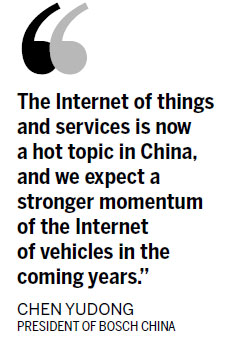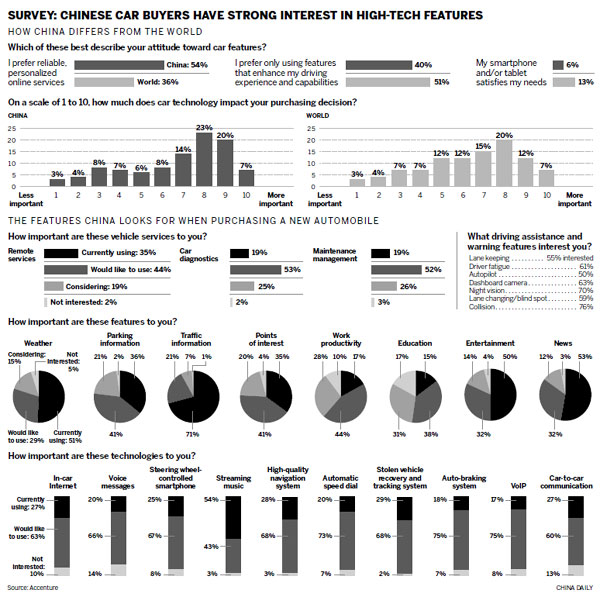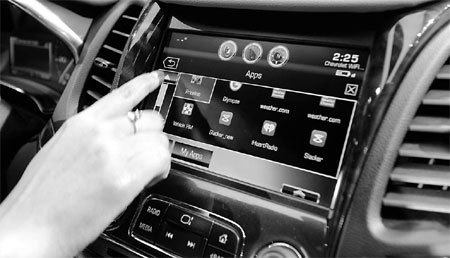Connectivity helping to drive up demand for new autos in China
Updated: 2014-06-01 07:28
By Li Fangfang(China Daily)
|
|||||||||
Automobiles and the Internet are two revolutionary inventions to greatly change people's lives and promote society's development over the past century.
Now, connectivity, also known as the Internet of vehicles, will reshape lives anew, and perhaps even more significantly.
Statistics from information provider EnfoDesk showed that in 2013, China's vehicle connectivity technology users increased by 10 times from the 50,000 they numbered in 2005. It predicted the population of technology adopters will reach 10 million by 2015, accounting for about 10 percent of drivers in the country, and 20 percent in 2020, with market revenue of more than 50 billion yuan ($8 billion).
EnfoDesk expects the output value of vehicle connectivity in China could catch up with that of mobile Internet by 2017 or 2018.
The Global System for Mobile Communications Association forecast that by 2020, all new vehicles will be equipped with some type of connectivity technology.
Li Zhaorong, a researcher dedicated to vehicle connectivity, said the sector is getting more lucrative in China, as numbers grow for both mobility and the mobile Internet.
"The more discerning requirements of consumers, along with the more complicated modern transportation and road conditions, the increasing awareness of safety and the booming number of vehicles all raise the demand for vehicle connectivity technologies," Li said.
According to a survey conducted by consulting firm Accenture in 12 countries with huge numbers of vehicles, including China, the United States, Italy and Brazil, connectivity has more than doubled the impact of vehicle performance on consumers' purchase decisions.
About 39 percent of 14,000 respondents said that connectivity was a major consideration in choosing a car, while only 14 percent said driving performance was the main thing they cared about.
The survey also found that Chinese drivers exhibited the strongest interest in connectivity technologies, other than powertrain, among 12 countries.
Chinese consumers also voiced much higher requirements for transportation information, including navigation, traffic conditions, speed camera, and parking lots and POI (point of interest) locations.
In addition, Chinese drivers came in at No 1 in terms of connectivity technology and service usage, with the highest expectations for new innovations in the future.
Although fully automatic driving is still in the concept car stage and has not officially hit the road, Accenture's survey indicated that a whopping 90 percent are interested in related technologies, such as lane-change warning systems, crash warning systems, and automatic braking and parking systems.
The company noted such a significant demand will help promote the wide application of automatic driving technologies.
Seeing interest increasing, especially in China, German technology provider Bosch GmbH is reaching out to new business areas and promoting new business models.
The company estimated that more than 75 percent of the global population and 6.6 billion devices will be connected to the Internet by 2015, which will bring more convenience to daily life and significantly improve energy efficiency.

"The Internet of things and services is now a hot topic in China, and we expect a stronger momentum of the Internet of vehicles in the coming years," said Chen Yudong, president of Bosch China. "As an innovative company, Bosch is ready for the business opportunities it brings us."
Leveraging its sensor and software technologies, Bosch is working to establish the frameworks and foundations of connectivity.
Bosch Sensortec, a subsidiary that specializes in MEMS (Micro-Electro-Mechanical Systems) technology, launched its Asia Pacific headquarters in Shanghai in 2013.
The company develops and markets micro-mechanical sensors for consumer electronics, mobile phones, safety systems, industrial technology and logistics. Every other smartphone across the globe now uses Bosch sensors.
While MEMS technologies are regarded as the hardware basis for connectivity, Bosch Software Innovations has launched a pilot project for promoting electric vehicle application in Shanghai in 2013.
Automated driving is another example of the potential advantages of connectivity technologies.
With components such as sensors, cameras and electronic control units, all of which can enable connectivity, Bosch's driving assistance functions are among those that are leading the way to automated driving.
lifangfang@chinadaily.com.cn
|
A dashboard system with 4G mobile Internet connectivity is seen in a Chevrolet Impala. It is predicted that by 2020, all new vehicles will be equipped with connectivity technology. Daniel Acker / Bloomberg |

(China Daily 06/01/2014 page9)
